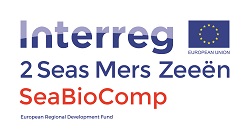SeaBioComp: Bio-based composites for the marine environment

With the ever increasing world production and consumption of plastic materials and composites comes a growing concern with both the waste treatment and greenhouse emission during production of these predominantly oil-based materials.
Especially the long-term ecological impact of plastic litter and microplastics in the marine environment is a growing issue that has gained considerable momentum in public perception and global media. Bio-based polymers, or polymers from renewable resources, can prove a viable substitute to conventional oil-based polymers for many applications with significantly reduced greenhouse emission and potential biodegradability.
The current trend in the field of polymer composites, or plastic material that are reinforced with e.g. glass or carbon fibre, is to find bio-composite alternatives for both the matrix polymeric plastic and fibre reinforcement. These materials will cater to the current demands in several fields including the maritime industry for substitute materials to replace conventional petrol-based composites in e.g. fish & seaweed farming, energy harvesting, boats, pontoons, anchoring and buoy elements. The bio-composites will not only reduce the depletion of fossil-based resources but should also limit the emission of greenhouse gases and ecotoxic impact of microplastics, while allowing recycling through the use of thermoplastic bio-polymers. At the same time, these materials should meet the highest technical performance standards and withstand harsh sea conditions, including mechanical forces, aggressive environment, and intense UV light.
Overall objective
SeaBioComp will develop and deliver demonstrators using innovative bio-based thermoplastic composite materials with the following characteristics:
* A tailored durability according to the specific application (2 to >20 years) for that demonstrator in a marine environment as measured by newly developed analytical methods
* At least equivalent mechanical properties compared to conventional oil-based composites
* Reduced CO2 emission (30%)
* Reduced ecotoxic impact in the marine environment due to microplastics as measured by newly developed analytical methods
* Demonstrated recycling potential of the used materials in the demonstrator
These characteristics should allow a decrease the overall ecologic impact by 50% compared to conventional oil-based counterparts through the entire value chain from production to waste treatment. These proposed bio-composite materials and the developed analytical protocols for long-term durability and ecotoxicity should lead to a shift in mind-set along the value chain realizing that bio-based composites may offer a realistic alternative to their oil-based counterparts.
Main Outputs
SeaBioComp aims to develop the following outputs in terms of novel thermoplastics biocomposites:
* 3 semi-industrial demonstrators of thermoplastic biocomposites with tailored durability, each representing a different composite production technique
* A pilot production equipment for large scale additive manufacturing of fibre-reinforced thermoplastic biocomposites and proof the potential by generating 1 semi-industrial demonstrator
SeaBioComp aims to develop the following outputs in terms of analytical protocols:
* Optimised analytical protocols to characterise the tailored, long-term durability of the formed demonstrators in a marine environment
* Optimised analytical protocols to characterise the improved ecotoxicity of the formed demonstrators in a marine environment
These protocols will be used to prove the reduced ecological impact of the developed biocomposites in a marine environment and serve as a benchmark for future regulations and standardized protocols for public authority.
SeaBioComp will distribute this information through the formation of a collaborative transregional cluster promoting a closer, more effective and operational cooperation among the key stakeholders within the bio-economy (Key Enabling Technology) and more specific the biocomposites for marine environment.
Cross-border approach
To ensure the success of this project, expertise in various domains including polymer formulation and textiles (Centexbel, CETI), composite formation (ARMINES, UPlymouth & PolyProducts BV), ecological impact and durability studies in sea environment (UPortsmouth, VLIZ & IFremer) has been combined in the SeaBioComp-partnership. The combination of renowned universities, research centres and composite companies with sector associations including Matikem, Marine South East) and public authorities (REWIN) ensure that the goals of the project stay on track and remain industrially relevant.
Contact information
Coordinator: Gertjan Vancoillie, gvc@centexbel.be
UK contact Simon Powell, Marine South East, sp@mseuk.org
[partner specific contact information]
Website: http://www.seabiocomp.eu (under construction)







